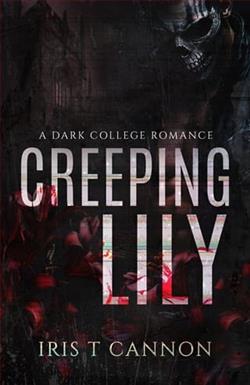Page 1 of Matches and Mistletoe
1
Every December the Felwitch stalked out of the forest with a sack of gifts and a rictus grin for the people of Embry Hollow.
A group of children always gravitated to him at once, like freezing raindrops racing down leaded window glass, pooling on the ledge before running off. The little ones bounced on their boot soles, squeaking as the Felwitch began tossing dozens of misshapen toys from his bag—crooked dolls with blank faces and eyes winking from their jaws and temples, dismal jack-in-the-boxes that groaned woefully before ejecting taxidermy rats on springs, puppets with backward limbs, caps decked with ragged crow feathers.
Thistle had reached her twenty-second year, but ever since her tenth she’d suspected that perhaps the gifts looked gruesome to everyone but their owners, because each child seemed utterly overcome with the beauty of their own presents, and none of them envied the gifts anyone else received.
The Felwitch brought gifts for the adults, too, but of an altogether different nature. Their value was not disguised in the slightest. A brand-new wheelbarrow. A brightly painted windowbox. A gleaming spinning wheel, beautifully crafted. A set of fine sharp tools. A strong-legged colt, a fat chicken, a healthy lamb.
Thistle had received her own share of gifts from the Felwitch—reams of paper and a quill one year, a dark blue cloak the next. The most curious one of all had come to her last year. She had accepted a tiny paper parcel and opened it to find a pair of fine gold earrings.
She had never told anyone of her desire for earrings, and she was too shy to go to the blacksmith or to one of the goodwives to have her lobes pierced. So she did not wear the earrings, but kept them tucked in a drawer to look at sometimes.
This winter, the Felwitch stalked past her and dropped into her chilled hands a heavy book. It was all Thistle could do not to leaf through the pages right then. But she knew once she opened it, she would be lost to its wonders, and she wanted to be present for the day’s festivities. So she simply hugged the book to her chest as the Felwitch moved on to the next villager.
There were limits to the Felwitch’s power. He never brought anyone a new house, or an entire herd of cattle, or a deceased loved one. But the gifts he gave always tucked neatly into a nook within the recipient’s heart, filling it perfectly.
When he had finished doling out the gifts, there slid from the sack an entire table, nearly as long as the town square was wide, laden with steaming food—roast goose with crackling brown skin, steaming tarts packed with glistening ruby cherries, carrots glazed in brown sugar, white rolls as plump and soft as a baby’s cheeks.
While all the villagers were crowded around the feast table, eating their fill, the Felwitch wandered through the streets, collecting things. Unwanted things. He took the broken ax handles, the rotted fruit crates, the threadbare clothes, the unraveled baskets, the buckets with holes. He took the bony, ancient mare, no longer good for labor of any kind, and the diseased chickens, and the intractable mule. They all walked dully into the Felwitch’s sack, which swallowed them without growing any larger.
A delightful deal for the villagers, truly. Yield the Unwanted to the Felwitch, and receive what they desired in turn.
But their dealings with the Felwitch were not free from the occasional morbid shadow. The oldest goodwife in town had whispered a dark story to Thistle. One year, decades ago, the Felwitch had taken aperson. An infant, the youngest of the Müller family. Master Müller and his wife had six children already, and the seventh was a sickly youngster, with bruises on his scrawny legs where his siblings pinched him, and a thin, haunted cry his mother rarely heeded.
When the Felwitch took the baby, everyone voiced a faint protest—but the magic of the Felwitch never lied. Everything he took was truly Unwanted. Most people seemed to forget the baby quickly, but Gammer Brennach never had.
“I tried to want it,” she’d told Thistle, while moisture gathered in her rheumy old eyes. “But I had four young’uns of my own. Couldn’t bear the weight of another.”
What had the Felwitch done with the child?
The question had plagued Thistle since she heard the story, and it gnawed at her now as she watched his cloaked figure recede down the street. She stared at the long groove his heavy sack had delved into the half-trampled snow.
What else would he take this year?
She wondered, too, what Granda’s winter wish might have been, had he survived another two months. He’d passed quietly in his sleep, without gasping, panicking, and struggling as their neighbor had last fall. For the ease of his passing, she was grateful.
But since his death, she had wrestled with the sick uncertainty that her weavings were not as neat, as tight, or as beautiful as his had been. No matter how hard she tried, she could not achieve the quality and mastery of his works.
The townspeople had noticed. Quietly they had slunk, one by one, to Molly’s shop, trusting her loom to yield the blankets, cloaks, and rugs they needed.
If only Granda had allowed Thistle to try learning a different trade. If only her fingers were not so clumsy. If only the old loom were not so finicky, seeming to yield its best work only to Granda’s hands. It made sense, Thistle supposed. After all, the loom had been a long-ago gift from the Felwitch. There was likely some strange magic within its beams and rollers.
If only she did not hate weaving so damn much.
The Felwitch had gone beyond her sight. He had probably ducked into an alley to collect some refuse.
Sighing, still hugging her book, Thistle turned to the feast table. She wandered down its length, looking for a space on the benches where she could squeeze in and help herself to some food. Shoulders jostled, heads turned toward each other, mouths joking, laughing, spraying crumbs. Children squirmed and giggled and squalled, waving around their new toys as their mothers tried to persuade them to eat.
For a moment Thistle thought Marcus and his husband might let her sit with them. But then they exchanged glances and scooted slightly, closing up the narrow space between them just enough that she certainly couldn’t fit.
She was left to wander on, down the interminable length of that bountiful table, while the villagers chattered and guffawed and gulped the wine that sloshed from ornate decanters.
Thistle’s cheeks glowed hot as a sickle being beaten on the blacksmith’s anvil. Her boots seemed to pull her back as she tried to walk faster, tried to hurry through this humiliation and find a seat, a seat—a buttock’s worth of space on the end of a bench would do. But every time she thought she saw a spot, it seemed to vanish before she reached it. Someone would adjust their position casually and then there would be no room for her.
She was the only one not seated. They could not help but notice. But perhaps they did not realize it, she told herself. She screwed up her courage and touched Goodwife Lotte on the shoulder.
“Might I squeeze in?” Her voice seemed to dissolve in the frosty air the moment she spoke. Perhaps it had grown threadbare from lack of use. Thistle did not like to talk; she found the usual topics of conversation in the village quite tedious. The raising of children and chickens, the rotating of garden crops and the running of errands did not interest her. A few times she had tried to speak of other things—of geography and music, of ship design and military strategies—the things she’d read of in Granda’s handful of books. But perhaps she spoke of those things in a dull, didactic way, for it seemed that no one except Granda cared to listen. Or perhaps she lacked enough color, beauty, and vivacity to keep her neighbors’ attention. Something about her was wrong—it must be. So was she had stopped speaking altogether, except for the most basic greetings and necessary phrases.















